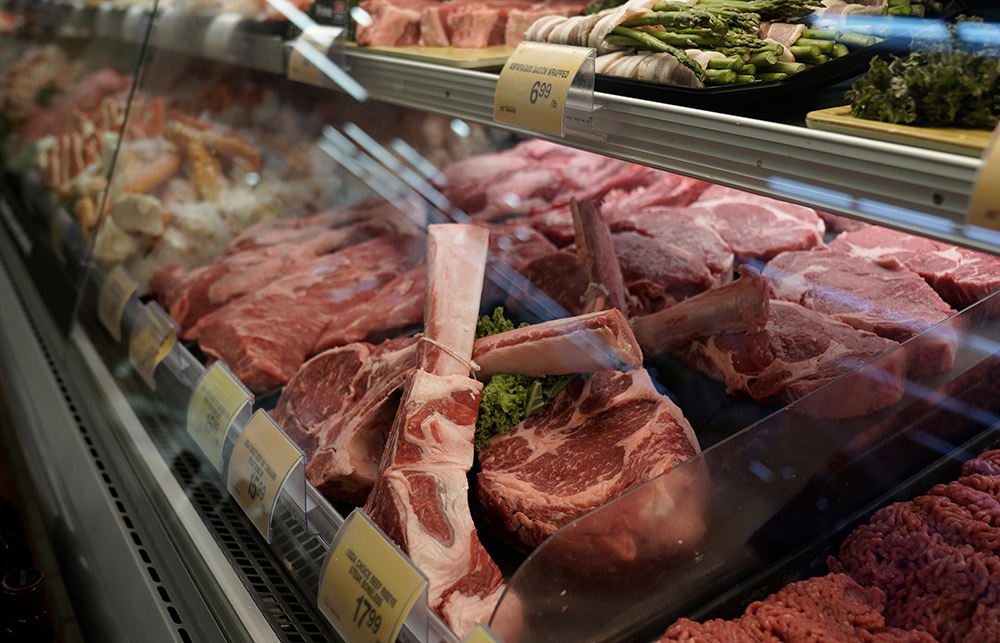
特朗普的竞选团队还没有找到攻击加州参议员贺锦丽(Kamala Harris)最好的切入点:她是左翼极端分子,还是对民主党进步派不屑一顾的保守派?
为了想方设法攻击加州参议员贺锦丽,美国副总统迈克•彭斯最近向牧场主们演讲时抛出了“红肉”这个议题,警告听众贺锦丽想让美国民众无肉可吃。“我们不能让乔•拜登和贺锦丽减少美国的肉品供应!”彭斯的话让牧场主们一片欢呼。
彭斯在提到贺锦丽作为总统候选人时曾经表示,我们应该考虑食物选择的环境影响。但一场疫情确实导致肉类供应短缺,而且政府发布了要求屠宰场继续营业的行政命令,因此肉类供应会影响大选这种观点并非无稽之谈。
事实上,历史上曾经出现过这种情况。
第二次世界大战期间,美国人为了支持军队海外作战,习惯了肉品定量配给。后来战争结束,美国战胜了德国和日本,然后开始飞速发展,但肉类供应问题依旧存在。
在战时,由政府主导的肉价上限意味着许多农户担心亏损,因此选择了停止生产,但为了打败轴心国这个共同的愿望,美国人愿意忍受少肉的饮食。
但战争结束后,政府取消肉价上限,肉价不出意外地开始飞涨。1946年中期选举期间,试图拯救民主党的时任总统哈里•杜鲁门再次执行肉价上限,但这一次他无法再依靠爱国主义鼓动农户们以难以为继的低价格生产肉类。
被此举激怒的肉品行业游说组织采取了报复措施,号召生产者停止把牲畜送到屠宰场。
《时代》周刊的埃米琳•路德在2016年回顾战后事件时曾经写道:“矿工们声称没有更多的肉,他们无法工作,并开始在华盛顿举行罢工。医院称只能找到马肉提供给患者食用,让丑闻进一步发酵。仍在营业的肉店外排起的长队绵延几个街区,顾客彼此推搡撕扯。”
整个国家处在危机的边缘。《时代》周刊为此事发表过一篇社论,形容这种情况是“蔓延的肉荒”,并将其直接归咎于杜鲁门。国会里的民主党议员恳求杜鲁门总统想办法解决肉类供应危机,并将其作为选民最关注的问题。而共和党与今天的彭斯一样,开始宣扬支持肉类供应的信息。
俄亥俄州共和党议员约翰•沃里斯在竞选演讲中问道:“肉足够吗?”这句话很快成了选举中的战斗口号。共和党议员山姆•雷伯恩甚至将1946年的中期选举称为“牛排选举”,而且在很大程度上由于民众对肉类供应短缺问题的认知,导致民主党在参众两院均告失利。
今天,另一场肉类供应短缺同样恰逢一场重要的选举。但与1946年不同,2020年,美国的准备更加充分,足以应对肉类短缺。今天,面对屠宰场临时关闭,我们的应对措施可能是永久转变我们的饮食习惯,改为食用植物。
连锁快餐店已经开始提供基于植物的人造汉堡肉,即使最顽固的肉食者,包括报纸上的美食专栏作家,都对这种食物赞叹不已。大型肉类企业本身也在开发人造肉,比如嘉吉(Cargill)已经在中国开卖人造鸡肉。Perdue Farms等公司提供的混合产品包含动物和植物蛋白,这种产品降低了食物的生态足迹,同时可以进一步扩大肉类市场。(我的初创公司The Better Meat公司支持肉类公司将动物肉与植物蛋白配料混合,而且我们向Perdue提供基于植物的配料。)
我们有足够的肉可以享用,这或许是20世纪40年代中期的杜鲁门和国会的民主党人梦想的世界。今天,乔•拜登和民主党可以安心,因为食品技术的进步使我们可以不依赖动物生产人造肉食品,让美国人能够大快朵颐,尽情满足吃肉的欲望。人造肉除了在疫情期间提供帮助以外,还有另外一个优势:人造肉对地球和动物有益,并且其胆固醇含量为零。
美国曾经经历过肉类短缺危机。虽然现在认为贺锦丽想要这种情况再次上演或许有些可笑,但我们应该感到高兴的是,不同于杜鲁门的时代,现在我们有更多选择,而且蛋白质来源多样化对人体有益。(财富中文网)
本文作者保罗•夏皮罗为《干净的肉:人造肉的增长将引发餐桌革命,改变全世界》(Clean Meat: How Growing Meat Without Animals Will Revolutionize Dinner and the World)一书的作者,并担任The Better MeatCo.公司的首席执行官。
译者:Biz
2020年6月22日,位于圣迭戈的一家艾伯森(Albertsons)食品杂货店里,摆在肉类摊位上的牛肉块。迈克•彭斯指责贺锦丽试图让美国人民无肉可吃。
特朗普的竞选团队还没有找到攻击加州参议员贺锦丽(Kamala Harris)最好的切入点:她是左翼极端分子,还是对民主党进步派不屑一顾的保守派?
为了想方设法攻击加州参议员贺锦丽,美国副总统迈克•彭斯最近向牧场主们演讲时抛出了“红肉”这个议题,警告听众贺锦丽想让美国民众无肉可吃。“我们不能让乔•拜登和贺锦丽减少美国的肉品供应!”彭斯的话让牧场主们一片欢呼。
彭斯在提到贺锦丽作为总统候选人时曾经表示,我们应该考虑食物选择的环境影响。但一场疫情确实导致肉类供应短缺,而且政府发布了要求屠宰场继续营业的行政命令,因此肉类供应会影响大选这种观点并非无稽之谈。
事实上,历史上曾经出现过这种情况。
第二次世界大战期间,美国人为了支持军队海外作战,习惯了肉品定量配给。后来战争结束,美国战胜了德国和日本,然后开始飞速发展,但肉类供应问题依旧存在。
在战时,由政府主导的肉价上限意味着许多农户担心亏损,因此选择了停止生产,但为了打败轴心国这个共同的愿望,美国人愿意忍受少肉的饮食。
但战争结束后,政府取消肉价上限,肉价不出意外地开始飞涨。1946年中期选举期间,试图拯救民主党的时任总统哈里•杜鲁门再次执行肉价上限,但这一次他无法再依靠爱国主义鼓动农户们以难以为继的低价格生产肉类。
被此举激怒的肉品行业游说组织采取了报复措施,号召生产者停止把牲畜送到屠宰场。
《时代》周刊的埃米琳•路德在2016年回顾战后事件时曾经写道:“矿工们声称没有更多的肉,他们无法工作,并开始在华盛顿举行罢工。医院称只能找到马肉提供给患者食用,让丑闻进一步发酵。仍在营业的肉店外排起的长队绵延几个街区,顾客彼此推搡撕扯。”
整个国家处在危机的边缘。《时代》周刊为此事发表过一篇社论,形容这种情况是“蔓延的肉荒”,并将其直接归咎于杜鲁门。国会里的民主党议员恳求杜鲁门总统想办法解决肉类供应危机,并将其作为选民最关注的问题。而共和党与今天的彭斯一样,开始宣扬支持肉类供应的信息。
俄亥俄州共和党议员约翰•沃里斯在竞选演讲中问道:“肉足够吗?”这句话很快成了选举中的战斗口号。共和党议员山姆•雷伯恩甚至将1946年的中期选举称为“牛排选举”,而且在很大程度上由于民众对肉类供应短缺问题的认知,导致民主党在参众两院均告失利。
今天,另一场肉类供应短缺同样恰逢一场重要的选举。但与1946年不同,2020年,美国的准备更加充分,足以应对肉类短缺。今天,面对屠宰场临时关闭,我们的应对措施可能是永久转变我们的饮食习惯,改为食用植物。
连锁快餐店已经开始提供基于植物的人造汉堡肉,即使最顽固的肉食者,包括报纸上的美食专栏作家,都对这种食物赞叹不已。大型肉类企业本身也在开发人造肉,比如嘉吉(Cargill)已经在中国开卖人造鸡肉。Perdue Farms等公司提供的混合产品包含动物和植物蛋白,这种产品降低了食物的生态足迹,同时可以进一步扩大肉类市场。(我的初创公司The Better Meat公司支持肉类公司将动物肉与植物蛋白配料混合,而且我们向Perdue提供基于植物的配料。)
我们有足够的肉可以享用,这或许是20世纪40年代中期的杜鲁门和国会的民主党人梦想的世界。今天,乔•拜登和民主党可以安心,因为食品技术的进步使我们可以不依赖动物生产人造肉食品,让美国人能够大快朵颐,尽情满足吃肉的欲望。人造肉除了在疫情期间提供帮助以外,还有另外一个优势:人造肉对地球和动物有益,并且其胆固醇含量为零。
美国曾经经历过肉类短缺危机。虽然现在认为贺锦丽想要这种情况再次上演或许有些可笑,但我们应该感到高兴的是,不同于杜鲁门的时代,现在我们有更多选择,而且蛋白质来源多样化对人体有益。(财富中文网)
本文作者保罗•夏皮罗为《干净的肉:人造肉的增长将引发餐桌革命,改变全世界》(Clean Meat: How Growing Meat Without Animals Will Revolutionize Dinner and the World)一书的作者,并担任The Better MeatCo.公司的首席执行官。
译者:Biz
The Trump campaign has yet to figure out the best line of attack on Sen. Kamala Harris: Is she a left-wing extremist or a snub to the progressive wing of the Democratic Party?
In throwing the kitchen sink at the California senator, Vice President Mike Pence recently tried out some red meat on a crowd of ranchers, warning them that Harris wants to take their meat away. “We’re not going to let Joe Biden and Kamala Harris cut America’s meat!” Pence declared to the ranchers’ adoration.
Pence was referring to then-Presidential candidate Harris’s assertion that we should consider the environmental effects of our food choices. But in a time when we’ve experienced an actual pandemic-induced meat shortage along with an executive order aimed at keeping slaughtering plants open, the idea of meat availability playing a role in the election isn’t so farfetched.
In fact, it’s happened before.
During World War II, Americans became accustomed to meat rationing as part of the effort to support the troops abroad. When the war ended, the country was obviously flying high after its victory over Germany and Japan, but the problem of meat availability remained.
Wartime government-induced price ceilings on meat meant that many farmers simply chose not to produce for fear of losing money, but Americans were willing to endure the less-meat diet out of a shared desire to defeat the Axis enemies.
When the war ended, however, those ceilings were lifted, and unsurprisingly the price of meat skyrocketed. In the midst of the 1946 midterm elections, President Harry Truman, trying to save the Democratic Party, moved to enforce price ceilings again, but this time without the ability to rely on patriotism to encourage farmers to produce meat for untenably low prices.
Enraged, the meat lobby retaliated by having producers again cease sending animals to slaughter.
As Time’s Emelyn Rude wrote in 2016 of the postwar incident, “Miners declared they could not work without more meat and began striking in Washington. Hospitals stirred scandal by claiming they could only find horsemeat to serve their sick patients. The lines outside the butcher shops still in operation stretched for blocks and provoked shoving and scratching amongst the patrons.”
The country was on edge. Time itself even editorialized on the topic, blaming what it called the “widespread meat famine” directly on Truman. Congressional Democrats begged the President to do something about the meat crisis, declaring it the single biggest issue of concern to their constituents. The Republicans, just like Pence today, campaigned on a pro-meat message.
“Got enough meat?” asked Rep. John Vorys, a Republican from Ohio, in a campaign speech, a slogan which quickly came to be an election rallying cry. Rep. Sam Rayburn even dubbed the midterm election of 1946 the “beefsteak election,” and in substantial part owing to the perception of a meat shortage, Democrats lost control of both chambers of Congress.
Today, another meat shortage has coincided with an important election. But unlike in 1946, our nation in 2020 is better prepared to withstand a scarcity of animal protein. Today, our response to the temporary closing of slaughter plants can be a permanent opening of our dietary habits to actual plants.
Already, fast food chains are offering plant-based burgers that routinely wow the most inveterate carnivores, including newspaper food writers. Meat giants themselves are now the purveyors of plant-based meat, with companies like Cargill selling their plant-based chicken even in China. Others like Perdue Farms are offering blended products that are hybrids of both animal and plant proteins, lowering the ecological footprint of the food while helping meat go much further. (My startup, The Better Meat Co., enables meat companies to hybridize their animal meats with plant protein ingredients, and we provide plant-based ingredients to Perdue.)
Such a world—where we can essentially have our meat and eat it too—would have been a dream come true for President Truman and congressional Democrats in the mid-1940s. Today, Joe Biden and Democrats can rest assured that thanks to advances in food technology enabling us to produce meaty foods with less reliance on animals, Americans will be able to satiate our meat tooth all we want. And in addition to helping during the pandemic, plant-based meats also have the advantage of being better for the planet and animals, and having zero cholesterol, too.
Our nation has faced meat shortages in the past. While it may be laughable to think that Kamala Harris wants such an outcome again, we should just be glad that unlike in Truman’s day, we now have far more options, and diversifying our protein sources is good for us anyway.
Paul Shapiro is the author of Clean Meat: How Growing Meat Without Animals Will Revolutionize Dinner and the World and the CEO of The Better Meat Co.






